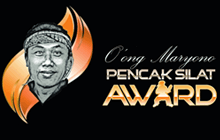Starting from this article the focus of our continuing exploration shifts from the history of pencak silat in Indonesia to the developments of one of its component, i.e. pencak silat sport (pencak silat olahraga). To understand such developments we need first to recall the pacific nature of the philosophical teachings of pencak silat as the question whether pencak silat sport competitions are consistent with the pencak silat principle of peace, or whether in fact they promote violence, has shaped the evolution of pencak silat olahraga in the past fifty years.
In brief, such teachings set the goal of achieving purity as the spiritual basis of Malay culture. The humanistic tradition of pencak silat recommends that a pesilat be humanitarian, honest, noble, modest, and sensitive to the suffering of others. Only when these characteristics are mastered and practised can a pesilat be called a ‘pendekar’ (master). This ideology of nobleness of mind and character (budi perkerti luhur) pervades all pencak silat styles in Indonesia. Although the key features vary from region to region and from perguruan to perguruan, in general pencak silat, aside from fostering physical dexterity, is meant to enhance spiritual strength, determination, and the restraint of emotions.
Philosophical principles are also reflected in pencak silat movements. For instance, blocking with the hand in front of the face can be interpreted as resistance toward seeing, hearing and saying unpleasant things. Likewise, the holding of the hand in front of the chest indicates that one must be patient, calm, and sympathetic of other people’s feelings, or in Javanese ‘tepa selira’.
Unequivocally, techniques of self-defence can be used only in an emergency, if a person is attacked by someone with evil intentions, and this attack cannot be averted:
Suppose a person attacks you with words and actions that hurt you, you must not let yourself be provoked to anger, or retort with an offensive attack, by striking out or hitting back. It is better to try once or twice to soothe the attacker, so that he has an opportunity to become aware of his deeds and reconsider his behaviour (Olahraga 1953:1).
Only if all efforts at pacification fail, can a pesilat react. Even then, his response should not display any sign of anger or arrogance, and he should never go as far as to injure and kill the opponent. It is sufficient to catch and lock the attacker’s movements so that he is rendered immobile and thus harmless. This code of conduct is also reflected in the typology of masters as articulated half in jest by the Pamur master, Hasan Habudin:
I was once asked: ‘Who is a master?’ I replied: ‘A master comes in various types, such as a rogue master, a stupid master, a dead master, and a genuine master. A “rogue master” is a master who fights death with death. A “stupid master” is a master who appoints himself as master. A “dead master” is a master who can’t defend himself. Finally, a “genuine master”, one who is really a master, is a master who can defend himself without hurting other people’.
Humans may try with all their might to attain goodness and purity. Yet, it is difficult, if not impossible, to escape from the many trials and temptations one faces daily. Are the normative requirements of pencak silat applicable in a reality that is far from ideal? The historical analysis presented in previous articles in this journal clearly indicates that, besides serving noble aims, pencak silat skills have at times been used (misused?) for violent and criminal purposes. In present-day Indonesia, the role of the ‘jago’ persists in various local adaptations such as the preman and the prokem in Jakarta, the jeger in West Java, the gali in Central Java, and the bromocorah in East Java. Several popular proverbs and sayings also give the impression that in everyday life, the pesilat is ready to fight. If in Minangkabau society there is the adage ‘Musuh indak dicari, jikok basuo pantang diilakkan’ (‘Don’t seek out the enemy, but if you meet him don’t evade him’), in Betawi society the saying goes ‘Kalau lu jual, gua beli’ (If you sell, I will buy’ meaning ‘If you challenge me, I will rise to the occasion’).
At this point, readers may wonder what is the real purpose of all the rules a pesilat is expected to follow, and why does oral culture not explicitly require avoiding confrontations. Are pencak silat values superfluous to actual practice? This question is particularly relevant with regard to pencak silat olahraga. A confrontation on the street could easily be dismissed as violating the budi perkerti luhur principle of pencak silat. But, what about pencak silat sports competitions? As will be shown in the next edition, this questions ensued a profound debate among perguruan and their answers were extremely diverse according to their specific views on how to preserve and develop pencak silat.
References:
Olah Raga
1953 Pentjak, Olahraga Nasional, 1 January, 1:4
